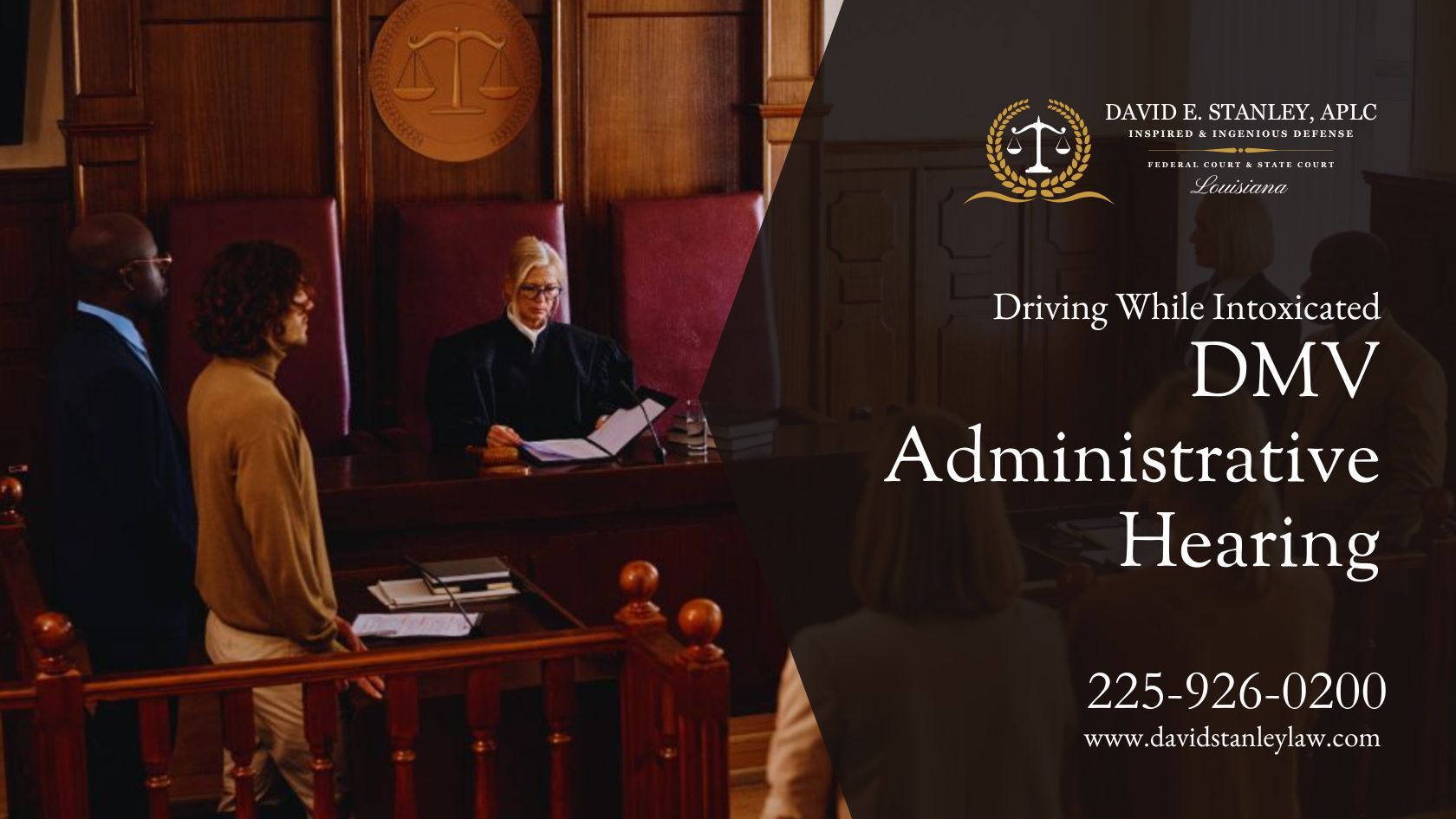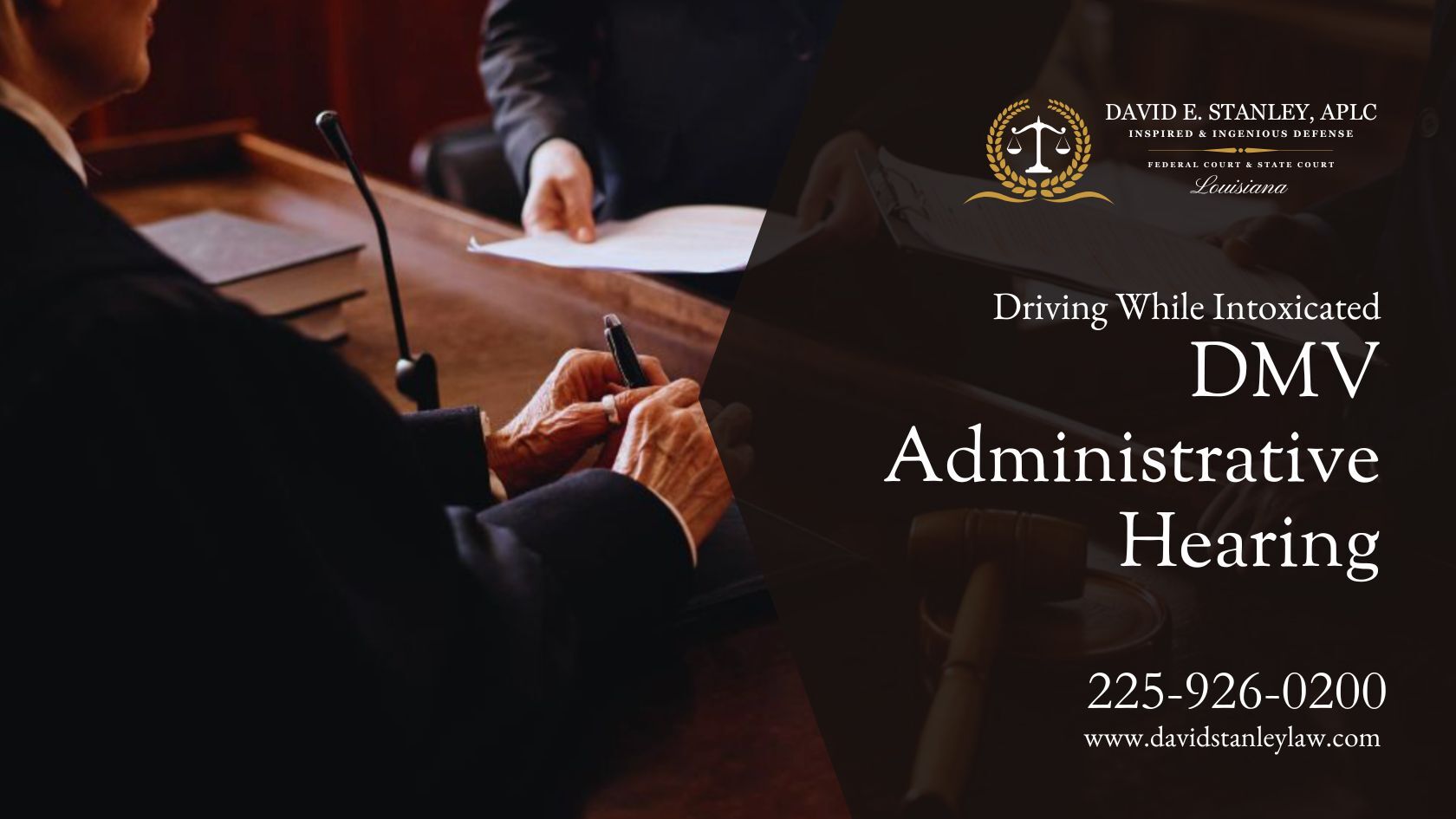DMV Administrative Hearing
Table of Contents
ToggleFollowing a DWI or DUI arrest, the DMV administrative hearing is a distinct legal procedure from a criminal case that decides whether to suspend your driver’s license. You have to ask for it within 30 days of your arrest; it is not automatic. An administrative law judge conducts the hearing and considers the material to determine whether the police had a valid reason to stop you and whether the correct procedures were followed. The DMV administrative hearing only considers your driving rights; unlike a criminal trial, it does not decide guilt. If you lose, your license will be suspended; if you win, it will be reinstated.

David E. Stanley, APLC, provides legal representation for DMV administrative hearings, helping protect your driving privileges after a DWI or DUI arrest. You have 30 days to request a hearing, making quick action essential. Our team challenges evidence, examines procedures, and works to prevent or reduce suspensions.
What You Need to Know About the DMV Administrative Hearing
DMV Has Proposed a Suspension of Your Driver’s License
After a DWI arrest, law enforcement may request chemical testing, such as blood, urine, or a breath test. Refusal can lead to a one-year license suspension. Even if you consent, a blood alcohol content (BAC) above the legal limit may still result in a suspension.
You have the right to request a DMV administrative hearing to contest this. The hearing reviews whether the officer had probable cause and followed proper procedures. Unlike a criminal case, the DMV only requires sufficient evidence to uphold the suspension.
Given the legal and technical complexities, having legal representation can help protect your driving privileges.
Always Request a Hearing
Our firm consistently requests DMV administrative hearings for clients. Even in challenging cases, requesting a hearing creates an opportunity to delay or prevent a license suspension. It also grants access to DMV reports, helping us build a strong strategy for the related criminal case. Exercising this right is essential.
Once the driver or their attorney requests a hearing, the DMV promptly provides the date and time. An administrative law judge oversees the case and typically issues a decision within two weeks. If the judge upholds the suspension, the DMV notifies the driver of the start date. If overturned, driving privileges are reinstated.

Can I Handle the DMV Hearing Myself?
While you technically can represent yourself at a DMV administrative hearing, it is strongly discouraged. These hearings involve complex legal issues, and even attorneys unfamiliar with the process can struggle. Many assume these hearings function like criminal trials, but they follow different legal standards and a lower burden of proof.
Our firm has handled hundreds of DMV hearings, using a structured approach to analyze evidence, statutes, and case law. With a strong database of past rulings, we build strategic arguments tailored to each case. If you’re facing a DWI in Louisiana, reach out for legal guidance.
Frequently Asked Questions
What Constitutes a Valid Hearing Request?
A valid hearing request constitutes meeting specific state requirements. In Louisiana, it must bear a USPS postmark within 15 days of a DWI arrest (30 days for non-DWI suspensions), while hand-delivered petitions are filed based on the receipt date. In California, oral requests are accepted through Driver Safety offices, provided the driver verifies their license number and address.
Can Hearing Outcomes Affect Criminal Cases?
Yes, hearing outcomes can significantly influence criminal cases. While administrative hearings and criminal cases are distinct, evidence from the hearing, such as suppressed breathalyzer results, can be used in a criminal defense. In Louisiana, attorneys often challenge DWI charges based on evidence or rulings from the administrative hearing, potentially altering the outcome of the criminal case. It underscores the importance of a well-prepared and strategic approach to the DMV administrative hearing.
What Happens if I Miss the Hearing?
Missing a hearing in Louisiana leads to an automatic 90-day license suspension. After 30 days, you may qualify for a hardship permit with limited driving privileges. Since default judgments almost always uphold the DMV’s decision, attending the hearing gives you the chance to contest the suspension. Your presence is key to protecting your driving rights.
DMV Administrative Hearing Lawyer

David E. Stanley, APLC, is an experienced defense attorney focusing on DMV administrative hearings. With extensive experience in handling license suspensions, DUI/DWI charges, and other DMV-related matters, he provides professional legal representation to help clients navigate complex administrative processes. Whether you’re dealing with a license suspension or a DWI administrative hearing, David E. Stanley offers strategic guidance to protect your driving privileges. His in-depth knowledge of DMV procedures strengthens your case and improves your chances of a favorable outcome. Don’t face a DMV hearing alone—contact David E. Stanley, APLC, today for consultation and professional legal support.
David E. Stanley, APLC
1055 Laurel Street, Suite 2 Baton Rouge, LA 70802
225-926-0200


